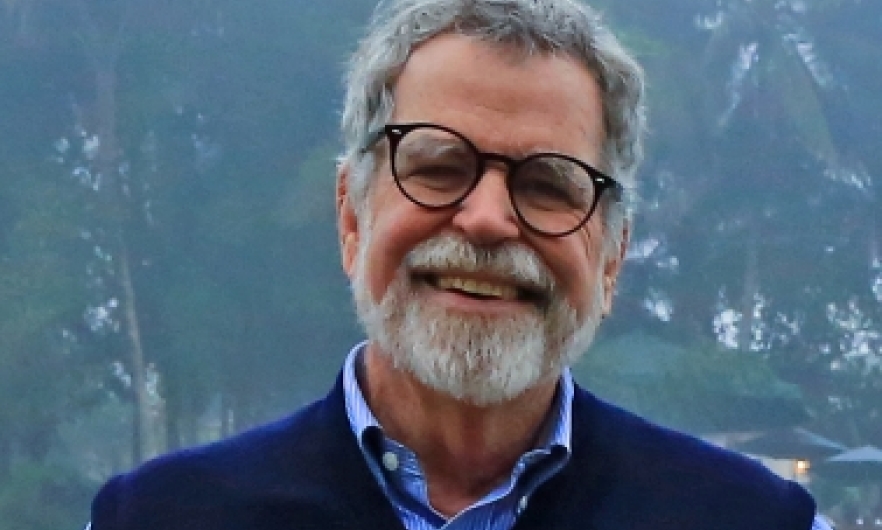Gilbert Burnham Receives APHA Carl Taylor Lifetime Achievement Award

Gilbert Burnham, MD, PhD, MSc, a professor emeritus in the Department of International Health at the Johns Hopkins Bloomberg School of Public Health, received the Carl Taylor Lifetime Achievement Award from the American Public Health Association’s International Health section. Burnham was recognized for his leadership, dedication to teaching and capacity-building, and excellence in research and applied practice work in the field of humanitarian health, primary health care, and community-level health programs.
The award is named in honor of the late Carl E. Taylor, MD, DrPH, a pioneer in the field of global primary health care who established APHA’s International Health section and was the founding chair of the Bloomberg School’s Department of International Health.
After serving in the army from 1969-1975, Burnham attended the London School of Hygiene and Tropical Medicine, where he received his Master of Science in 1976. Burnham started his career two months later, serving as director of a mission hospital in rural Malawi for 14 years. While in Malawi, he organized hospital training activities in lab technology, nursing, midwifery, and medical assistants into the Malamulo College of Health Sciences, which today has 1,500 students training as nurses, midwives, laboratory technicians, clinical officers, and public health officers. He established a community health outreach program and afforestation and water programs in the country. He also conducted a WHO-funded ivermectin randomized trial to control onchocerciasis, a neglected tropical diseases that can cause terrible skin disease and permanent blindness in humans. His work on the drug trial led to the establishment of the Malawi National Onchocerciasis Control Program, which eliminated elephantiasis and controlled onchocerciasis. His interest in refugees and humanitarian work stemmed from his time supervising a rural leprosy control program in the Shire Valley of Malawi in 1985 where 300,000 refugees fled from wars in Mozambique.
After earning his PhD at the University of London in 1988, Burnham joined the Bloomberg School as a faculty member in the Department of International Health in 1991. While a faculty member, Burnham founded what is now known as the Johns Hopkins Center for Humanitarian Health in 1998, a center dedicated to pursuing new knowledge in the field of humanitarian health and disseminating this learning to save lives and reduce human suffering and other consequences of humanitarian emergencies and disasters. Burnham developed some of the first courses for health in humanitarian emergencies, which played an influential role in shaping the field of humanitarian health and training future humanitarians.
“Gilbert Burnham is an extraordinary teacher and mentor who has taught so many generations of humanitarian health students who have gone onto be leaders in the field. His passion for teaching and travel is legendary. His experience, humor, and humility is an inspiration to so many JHU alumni and others around the world,” says Paul Spiegel, MD, MPH ’96, director of the Johns Hopkins Center for Humanitarian Health and professor of the practice in the Department of International Health.
Burnham has extensive practical experience in emergency preparedness and response, particularly in humanitarian needs assessment, program planning and evaluation. His research has been dedicated to improving health outcomes for vulnerable refugee populations. He has particular expertise in conducting research in conflict-afflicted countries such as Afghanistan and Iraq—his work on the mortality impact of the 2003 war in Iraq has been cited over 800 times. His research highlights include working on hospital care for Palestinian refugees in Lebanon, a North Korea mortality study, telemedicine education projects in Gaza, health reconstruction efforts in Afghanistan, and improving dialysis in conflict areas of Syria. In addition to his humanitarian research, Burnham has expertise in the fields of community-based health program planning and implementation, health information system development, management, and health system analysis.
In addition to his research and practice, Burnham has committed his life to training others in the field of humanitarian health, having designed and led many educational and training programs globally. Burnham established the Health Emergencies in Large Populations (HELP) course, offered by the Bloomberg School in collaboration with the International Committee of the Red Cross and the Johns Hopkins School of Nursing. The course has been offered twice a year for over 25 years and has trained thousands in the public health principles of disaster preparedness and management. Burnham has sought ways to ensure his educational offerings are accessible to those in low- and middle-income countries. He helped establish MPH programs at Makerere University in Uganda, University of Rwanda, and University of Kandahar in Afghanistan, including certificate programs in humanitarian health in Singapore and Korea. His course on quality management for health systems in resource-constrained contexts led to the establishment of the National Quality Assurance Program in Uganda. In 2017, he initiated the development of a massive open online course (MOOC) on public health in humanitarian crisis, teaching approximately 20,000 students worldwide.
Burnham has shaped the field of humanitarian health in profound ways. His work on developing and rehabilitating health systems in fragile settings has been used in many countries. He led the development of balanced score cards in Afghanistan, which are still used as an important tool to this day. Burnham’s passion for protecting the health and dignity of the most vulnerable, particularly those who have suffered through conflict and displacement, are reflected in his research, practice, and teachings.
The award will be presented at the APHA Annual Meeting in Boston on November 8, 2022.
